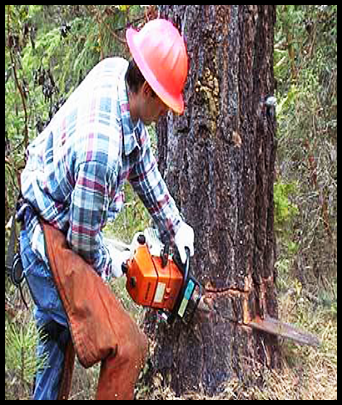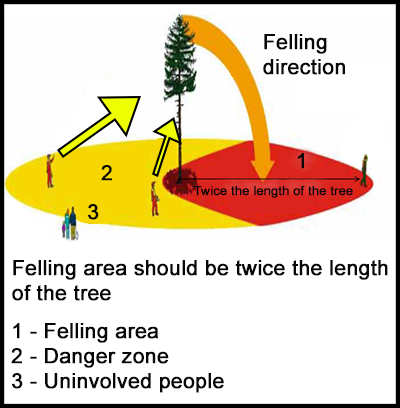-
What happened?
An employee was cutting trees at his cabin. He was wearing hearing protection and protective clothing.
At the same time, a neighbour was cutting trees nearby.
The neighbour lost control of a falling tree. The tree hit the employee.
The employee suffered broken ribs, lung punctuation, bruises and shock. He was transported by boat and ambulance to the hospital. Luckily he fully recovered!

-
Why did it happen?
Lack of protection of the working area: the employee and the neighbour were working too close to each other.
The employee did not stop work when he realised his neighbour was also working nearby.
The employee and the neighbour did not communicate.
The employee could not hear the neighbour shouting a warning because of noisy chainsaws, hearing protection and the noise of the falling tree.

-
What did they learn?
Stop working when someone else is working in your safety zone.
Ask a professional if you do not know how to fell trees.
Only undertake felling and crosscutting if you are:
- physically fit and reasonably active.
- trained or experienced in the use and maintenance of chainsaws.
- trained (or being trained) or are experienced in felling and crosscutting.
- not under the influence of drugs or alcohol, or are tired or fatigued.
- fully equipped to carry out the job.
- with someone who can assist or obtain help in an emergency. Never work alone while felling trees or using a chainsaw.

-
Ask yourself or your crew
Have we checked for overhead power lines? Are we at least 10 feet away from power lines? Is there an observer to watch out for power lines?
Have we informed co-workers and neighbours in the vicinity?
If a ladder is used, is it tied to the tree? Does it provide access above the branch?
Is a fall-arrest harness attached to a secure part of the tree?
Are warning signs around the work site to prevent public access?
Are control lines used on trees, to direct their fall in the intended direction?
When felling, is there a distance of at least twice the length of the tree between the tree and people?
Can a co-worker assist in controlling movement of falling branches?
Do all workers and observers have hard hats, goggles, hearing protection, fluorescent vests, cut-resistant trousers, and safety boots?

Add to homescreen
Content name
Select existing category:
Content name
New collection
Edit collection
What happened?
An employee was cutting trees at his cabin. He was wearing hearing protection and protective clothing.
At the same time, a neighbour was cutting trees nearby.
The neighbour lost control of a falling tree. The tree hit the employee.
The employee suffered broken ribs, lung punctuation, bruises and shock. He was transported by boat and ambulance to the hospital. Luckily he fully recovered!

Why did it happen?
Lack of protection of the working area: the employee and the neighbour were working too close to each other.
The employee did not stop work when he realised his neighbour was also working nearby.
The employee and the neighbour did not communicate.
The employee could not hear the neighbour shouting a warning because of noisy chainsaws, hearing protection and the noise of the falling tree.

What did they learn?
Stop working when someone else is working in your safety zone.
Ask a professional if you do not know how to fell trees.
Only undertake felling and crosscutting if you are:
- physically fit and reasonably active.
- trained or experienced in the use and maintenance of chainsaws.
- trained (or being trained) or are experienced in felling and crosscutting.
- not under the influence of drugs or alcohol, or are tired or fatigued.
- fully equipped to carry out the job.
- with someone who can assist or obtain help in an emergency. Never work alone while felling trees or using a chainsaw.
Ask yourself or your crew
Have we checked for overhead power lines? Are we at least 10 feet away from power lines? Is there an observer to watch out for power lines?
Have we informed co-workers and neighbours in the vicinity?
If a ladder is used, is it tied to the tree? Does it provide access above the branch?
Is a fall-arrest harness attached to a secure part of the tree?
Are warning signs around the work site to prevent public access?
Are control lines used on trees, to direct their fall in the intended direction?
When felling, is there a distance of at least twice the length of the tree between the tree and people?
Can a co-worker assist in controlling movement of falling branches?
Do all workers and observers have hard hats, goggles, hearing protection, fluorescent vests, cut-resistant trousers, and safety boots?
An employee was cutting trees at his cabin. He was wearing hearing protection and protective clothing. At the same time, a neighbour was cutting trees nearby. The neighbour lost control of a falling tree. The tree hit the employee.














